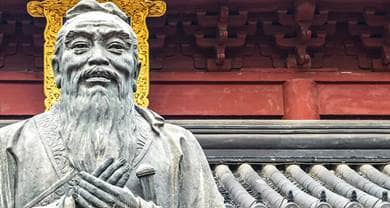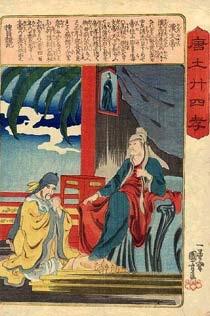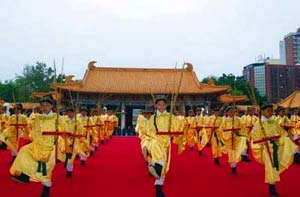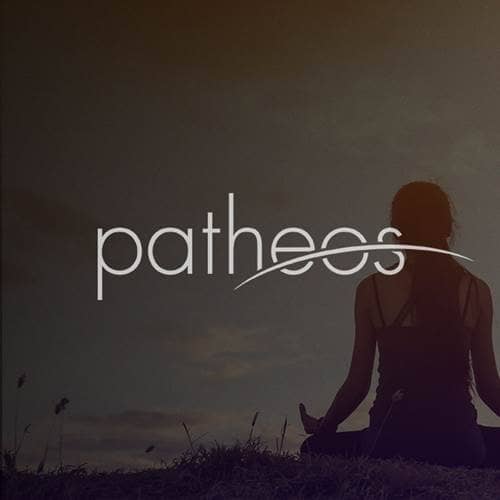- Trending:
- Pope Leo Xiv
- |
- Israel
- |
- Trump
- |
- Social Justice
- |
- Peace
- |
- Love

RELIGION LIBRARY
Confucianism
Sacred Time
As Kongzi stated that ultimate reality is beyond human comprehension, there is no sense of sacred time outside of ordinary time. Kongzi was a great supporter of li (ritual), as he felt that ritual solidified human social bonds; thus, in a sense, ritual sacralized ordinary time and daily life.
For Kongzi, rigorous attention to li provides a kind of self-replicating blueprint not only for good manners and taste, but also for personal morality and social order:
Do not look at, do not listen to, do not speak of, do not do whatever is contrary to ritual (Lunyu 12:1).
Appropriately quoting a poem from the Shijing, being the perfect guest or host, and correctly performing a public ceremony all are ritual actions, and all serve a common end: they regulate and maintain order. The nature of this order is threefold: aesthetic, moral, and social. It is aesthetic -- quoting the Shijing upholds the cultural hegemony of Zhou literature and the conventions of elite good taste. Moreover, it is moral -- good manners demonstrate both concern for others and a sense of one's place. Finally, it is social -- rituals properly performed duplicate ideal hierarchies of power, whether between ruler and subject, parent and child, or husband and wife. For Kongzi, the paramount example of harmonious social order seems to be xiao (filial piety), of which jing (reverence) is the key quality:
Observe what a person has in mind to do when his father is alive, and then observe what he does when his father is dead. If, for three years, he makes no changes to his father's ways, he can be said to be a good son (Lunyu 1:11).
[The disciple] Ziyu asked about filial piety. [Kongzi] said, "Nowadays, for a person to be filial means no more than that he is able to provide his parents with food. Even dogs and horses are provided with food. If a person shows no reverence, where is the difference?" (Lunyu 2:7)
In serving your father and mother, you ought to dissuade them from doing wrong in the gentlest way. If you see your advice being ignored, you should not become disobedient but should remain reverent. You should not complain even if you are distressed. (Lunyu 4:18)
 The character of this threefold order is deeper than mere conventions such as taste and decorum, as the above quotations demonstrate. Labeling it "aesthetic" might appear to demean or trivialize it, but to draw this conclusion is to fail to reflect on the peculiar way in which many Western thinkers tend to devalue the aesthetic. In Thinking Through Confucius (SUNY Press 1987), David Hall and Roger Ames argue that this "aesthetic" Confucian order is understood to be both intrinsically moral and profoundly harmonious, whether for one's own household, the court of one's king, or the cosmos at large. When persons and things are in their proper places -- and here tradition is the measure of propriety -- relations are smooth, operations are effortless, and the good is sought and done voluntarily. In the hierarchical political and social conception of Kongzi (and all traditional Chinese thinkers), what is below takes its cues from what is above. A moral ruler will diffuse morality to those under his sway; a moral parent will raise a moral child:
The character of this threefold order is deeper than mere conventions such as taste and decorum, as the above quotations demonstrate. Labeling it "aesthetic" might appear to demean or trivialize it, but to draw this conclusion is to fail to reflect on the peculiar way in which many Western thinkers tend to devalue the aesthetic. In Thinking Through Confucius (SUNY Press 1987), David Hall and Roger Ames argue that this "aesthetic" Confucian order is understood to be both intrinsically moral and profoundly harmonious, whether for one's own household, the court of one's king, or the cosmos at large. When persons and things are in their proper places -- and here tradition is the measure of propriety -- relations are smooth, operations are effortless, and the good is sought and done voluntarily. In the hierarchical political and social conception of Kongzi (and all traditional Chinese thinkers), what is below takes its cues from what is above. A moral ruler will diffuse morality to those under his sway; a moral parent will raise a moral child:
Let the ruler be a ruler, the subject a subject, a father a father, and a son a son (Lunyu 12:11).
Direct the people with moral force and regulate them with ritual, and they will possess shame, and moreover, they will be righteous (Lunyu 2:3).
In this sense, all time not only is sacred time, but all time also is the occasion for bringing oneself and one's society into harmony through ritual. Ancestor worship, for example, takes place year-round among observant Confucians. Offerings of incense (which conveys the concerns of the living to the deceased), fruit, and cooked rice are made daily, weekly, or every fifteen days, on holidays, or on anniversaries of the ancestor's death.
 Nonetheless, certain times make this paramount Confucian responsibility more vivid. These include the spring festival known as Qingmingjie (Clear and Bright Festival) and the autumn festival known as Guijie (Ghost Festival). Guijie is observed on the thirteenth day of the seventh lunar month, which in turn is known as "Ghost Month" (Guiyue), because it is at this time that the spirits of the dead are supposed to wander the earth. Confucian traditions are combined with Buddhist and Taoist elements in the celebration of this festival, which commemorates the rescue of a suffering mother in an undesirable realm of rebirth by her filial son. While Buddhists and Taoists offer liturgies for the relief of ancestors suffering in their rebirths during Guijie, Confucians offer items such as paper houses, clothing, and consumer commodities and elaborate meals to the ancestors. During Qingmingjie, popularly known as "Tomb-Sweeping Day," families visit and clean their ancestors' burial places, conduct worship services, and share festive meals. Thus, during Guijie, the dead visit the living, and during Qingmingjie, the living seek out the dead.
Nonetheless, certain times make this paramount Confucian responsibility more vivid. These include the spring festival known as Qingmingjie (Clear and Bright Festival) and the autumn festival known as Guijie (Ghost Festival). Guijie is observed on the thirteenth day of the seventh lunar month, which in turn is known as "Ghost Month" (Guiyue), because it is at this time that the spirits of the dead are supposed to wander the earth. Confucian traditions are combined with Buddhist and Taoist elements in the celebration of this festival, which commemorates the rescue of a suffering mother in an undesirable realm of rebirth by her filial son. While Buddhists and Taoists offer liturgies for the relief of ancestors suffering in their rebirths during Guijie, Confucians offer items such as paper houses, clothing, and consumer commodities and elaborate meals to the ancestors. During Qingmingjie, popularly known as "Tomb-Sweeping Day," families visit and clean their ancestors' burial places, conduct worship services, and share festive meals. Thus, during Guijie, the dead visit the living, and during Qingmingjie, the living seek out the dead.
 One other particular sacred time observed by Confucians is September 28, on which Kongzi's birthday is commemorated. On this date, Confucian temples become the site of elaborate pageantry featuring meticulously researched ancient music and dance based on Han dynasty Confucian ritual manuals such as the Liji (Record of Ritual). Although the holiday has been celebrated for decades in Taiwan, where Confucianism was encouraged by the Nationalist government, only in the 1990s was the ceremony revived in mainland China. Wherever the holiday is observed, it is customary for students preparing for examinations to visit a Confucian temple and seek the blessings of the sage.
One other particular sacred time observed by Confucians is September 28, on which Kongzi's birthday is commemorated. On this date, Confucian temples become the site of elaborate pageantry featuring meticulously researched ancient music and dance based on Han dynasty Confucian ritual manuals such as the Liji (Record of Ritual). Although the holiday has been celebrated for decades in Taiwan, where Confucianism was encouraged by the Nationalist government, only in the 1990s was the ceremony revived in mainland China. Wherever the holiday is observed, it is customary for students preparing for examinations to visit a Confucian temple and seek the blessings of the sage.
Study Questions:
1. Are the concepts of "sacred" and "secular" meaningful in Confucian thought?
2. Why is filial piety so important to Confucians?
3. What are the goals of Confucian ritual practices?










